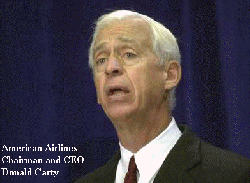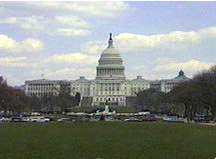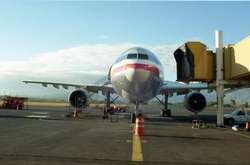By ANN Correspondent Pete Combs
 Go ahead: blame 9/11 for the airline
industry's financial free-fall; but don't stop there.
Go ahead: blame 9/11 for the airline
industry's financial free-fall; but don't stop there.
So said Don Carty, CEO of AMR Corp., parent to American
Airlines. As we previewed last week,
Carty prepared remarks delivered to the Senate Commerce
Committee on Capitol Hill Thursday, Carty said the industry would
have been faced with fundamental changes even if the terror
attacks on the US never happened.
"In recent years, the growth of discount airlines has reached
critical mass, and the upstarts -- unconstrained by and
uninterested in the old rules of the game -- now compete on roughly
three quarters of the routes we fly," Carty told the committee.
"This, along with the explosion of e-commerce -- which has made
airline pricing completely transparent to anyone with a PC --
preceded, and accelerated the airline revenue decline driven by
9/11 and the sluggish economy. Coincident with our revenue
struggles, we've seen rapid increases in our labor, distribution,
and tax costs."
 Add it up, along with the
September 11 attacks, Carty told the Senators, and "in this
industry's 75 year history -- a history long on distress and short
on economic success -- these are the most challenging times we've
ever faced."
Add it up, along with the
September 11 attacks, Carty told the Senators, and "in this
industry's 75 year history -- a history long on distress and short
on economic success -- these are the most challenging times we've
ever faced."
Hub And Spoke
American, of course, is the biggest airline in the world. Carty,
however, indicated that the carrier's glory days are over for the
foreseeable future. "Given the bursting of the economic bubble, the
rise of discount carriers, and the rapid growth of online travel
distribution-- it will be a long time, if ever, before airline
revenues approach the levels reached in the late 1990s and 2000.
Which means, we must attack our expenses. We must find new and
inventive ways to deliver value to our customers at a lower
cost."
To that end, American plans to cut $4 billion a
year from its permanent costs. Carty's strategy is a
relatively simple one: to return to profitability, American (and,
coincidentally, any other classic air passenger carrier) will have
to fundamentally change its business model, transforming into
something cheaper and more efficient. In 2001, US carriers lost a
record $7.7 billion. For 2002, analysts expect that number will top
$9.5 billion. Those disastrous numbers have led to bankruptcies at
several carriers, including the world's second-biggest, United, and
another world top-ten, US Airways.
 "As we witness the downsizing and layoffs
taking place at most major carriers, including our own, it is clear
that we will emerge a smaller airline with fewer people," said AMR
Corp's Carty.
"As we witness the downsizing and layoffs
taking place at most major carriers, including our own, it is clear
that we will emerge a smaller airline with fewer people," said AMR
Corp's Carty.
That does not mean an end to the current hub-and-spoke
system, where regional carriers flying from small- and
medium-sized markets into big international airports and back
again, said Carty. That might fly in the face of conventional
wisdom, given the number of bankruptcies among hub-and-spoke
carriers versus the continued profitability of regional and
point-to-point airlines. After all, Southwest Airlines, a low-cost,
no-frills carrier based in Dallas (TX) actually made a profit of
almost $75 million last year. JetBlue, which follows the same
model, is also profitable.
"From an American Airlines perspective, dramatic change really
just represents more of the same, since our 75 year history has
been marked, for the most part, by a continuous change imperative,"
Carty testified on Thursday. "But while 'evolve or perish' has long
been a way of life, I'd like to put to rest the notion that the
large, hub-and-spoke network model is no longer viable or
important.
"The ability we enjoy in this country to move from virtually any
medium to large community -- and many small communities -- on one
side of the country to a counterpart on the other side, as well as
dozens of international destinations -- at a reasonable cost and
with a reasonable level of convenience -- is a by-product of the
hub and spoke system. The large airline network model must
remain viable, as the mobility of people and cargo it
creates has become a fundamental pillar of our nation's economic
infrastructure," he said.
What About War?
 What does Carty expect from
Washington? He admitted Thursday, a lot of that depends on what
happens in Iraq over the next several months. Carty told the
committee an American-led war in Iraq would make the situation all
the worse. Just look at the figures for air travel during the first
Gulf War: down dramatically during late 1990 and much of 1991. Fuel
prices, spurred not only by the situation in the Gulf, but by a
strike that has virtually shot down the oil industry in Venezuela
-- a major US supplier -- have already started to rise. If
coalition troops march on Iraq, oil industry experts say the cost
of Jet-A will skyrocket.
What does Carty expect from
Washington? He admitted Thursday, a lot of that depends on what
happens in Iraq over the next several months. Carty told the
committee an American-led war in Iraq would make the situation all
the worse. Just look at the figures for air travel during the first
Gulf War: down dramatically during late 1990 and much of 1991. Fuel
prices, spurred not only by the situation in the Gulf, but by a
strike that has virtually shot down the oil industry in Venezuela
-- a major US supplier -- have already started to rise. If
coalition troops march on Iraq, oil industry experts say the cost
of Jet-A will skyrocket.
While citing the profitability of JetBlue and Southwest, some
senators on the Commerce Committee weren't unsympathetic toward
airlines like American, United and USAirways. "The moral of the
story," said US Senator John McCain (R-AZ), "is that every airline
does not have to be unprofitable."
Even Carty admitted, what Congress can do for the industry
"depends largely on whether or not we have a war in Iraq."
 The committee members agreed to
investigate several issues, such as the raising the amount of
foreign investments allowed among US-based airlines, or increasing
government subsidies to airplane manufacturers like Boeing. But
members also pledged to look at issues like the competitiveness of
cooperative booking arrangements between carriers. Many lawmakers
are worried that such agreements will end up costing air travelers
more money.
The committee members agreed to
investigate several issues, such as the raising the amount of
foreign investments allowed among US-based airlines, or increasing
government subsidies to airplane manufacturers like Boeing. But
members also pledged to look at issues like the competitiveness of
cooperative booking arrangements between carriers. Many lawmakers
are worried that such agreements will end up costing air travelers
more money.
[If, after all the efficiencies and cost-cutting are implemented,
and if these fail to yield profits, there's only one
more place from which the money can come: those who use the
airlines. No one should overlook lousy management; but conversely,
no one is entitled to low-cost air travel, either
--ed.]
 ANN's Daily Aero-Linx (04.15.24)
ANN's Daily Aero-Linx (04.15.24) Classic Aero-TV: 'No Other Options' -- The Israeli Air Force's Danny Shapira
Classic Aero-TV: 'No Other Options' -- The Israeli Air Force's Danny Shapira Aero-News: Quote of the Day (04.15.24)
Aero-News: Quote of the Day (04.15.24) Airborne 04.16.24: RV Update, Affordable Flying Expo, Diamond Lil
Airborne 04.16.24: RV Update, Affordable Flying Expo, Diamond Lil ANN's Daily Aero-Term (04.16.24): Chart Supplement US
ANN's Daily Aero-Term (04.16.24): Chart Supplement US







